Exploring Leadership Qualities and Abilities in Nursing Aspirants
VerifiedAdded on 2023/05/28
|14
|3924
|466
AI Summary
This portfolio explores the leadership qualities and abilities in nursing aspirants. It covers leadership philosophy, styles, competencies, and experience. The author shares personal experience and insights on effective leadership in nursing.
Contribute Materials
Your contribution can guide someone’s learning journey. Share your
documents today.
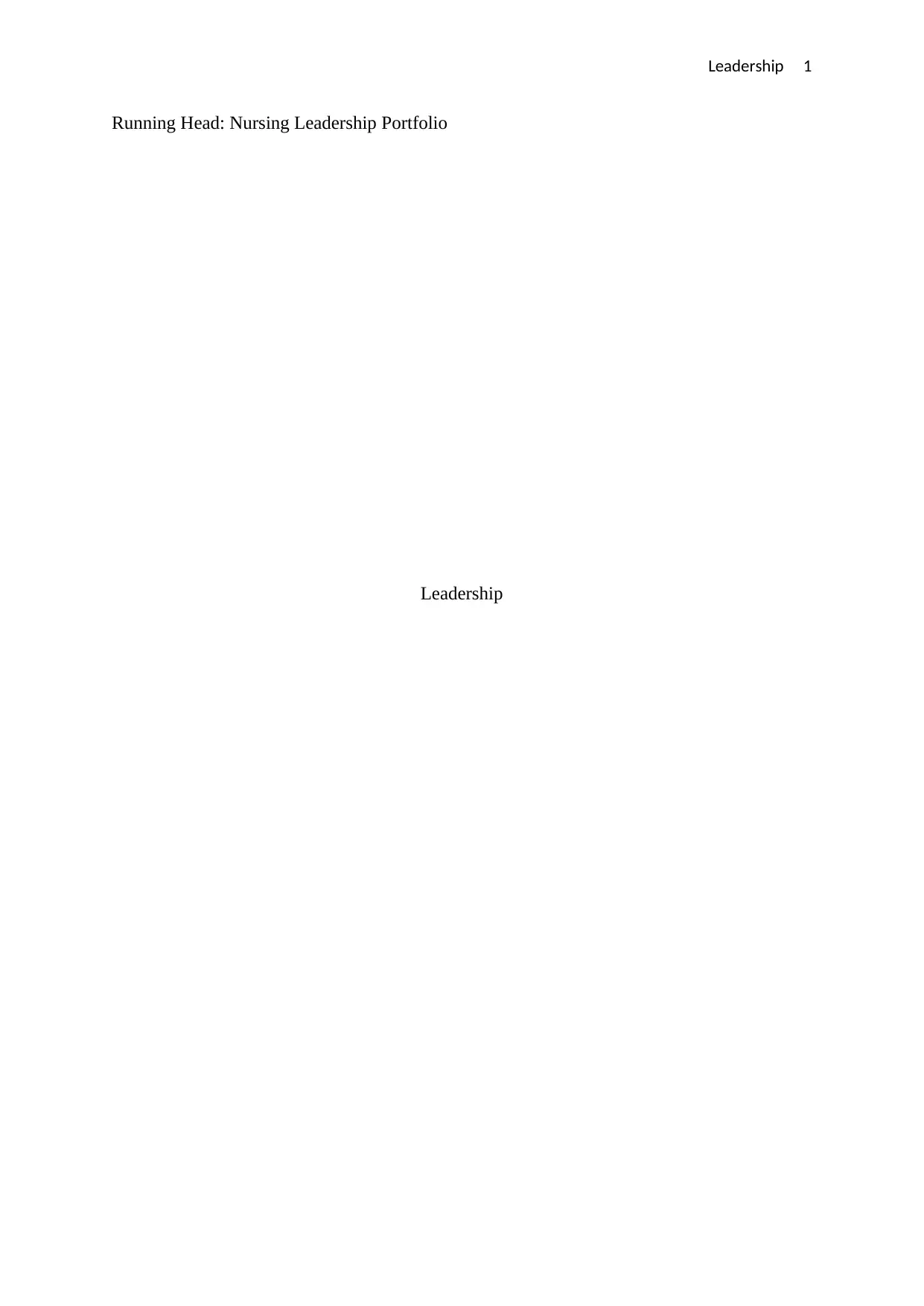
Leadership 1
Running Head: Nursing Leadership Portfolio
Leadership
Running Head: Nursing Leadership Portfolio
Leadership
Secure Best Marks with AI Grader
Need help grading? Try our AI Grader for instant feedback on your assignments.
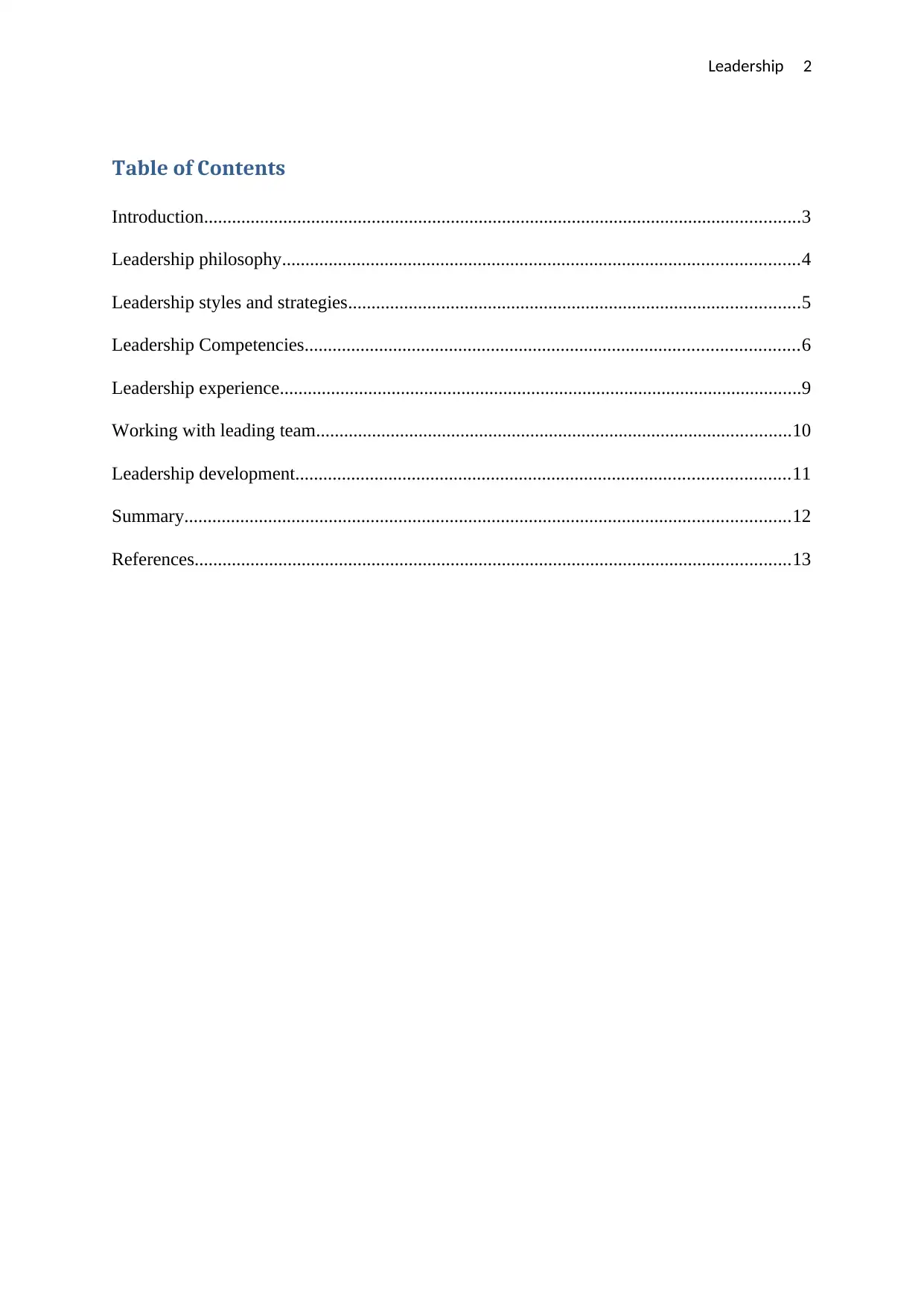
Leadership 2
Table of Contents
Introduction................................................................................................................................3
Leadership philosophy...............................................................................................................4
Leadership styles and strategies.................................................................................................5
Leadership Competencies..........................................................................................................6
Leadership experience................................................................................................................9
Working with leading team......................................................................................................10
Leadership development..........................................................................................................11
Summary..................................................................................................................................12
References................................................................................................................................13
Table of Contents
Introduction................................................................................................................................3
Leadership philosophy...............................................................................................................4
Leadership styles and strategies.................................................................................................5
Leadership Competencies..........................................................................................................6
Leadership experience................................................................................................................9
Working with leading team......................................................................................................10
Leadership development..........................................................................................................11
Summary..................................................................................................................................12
References................................................................................................................................13
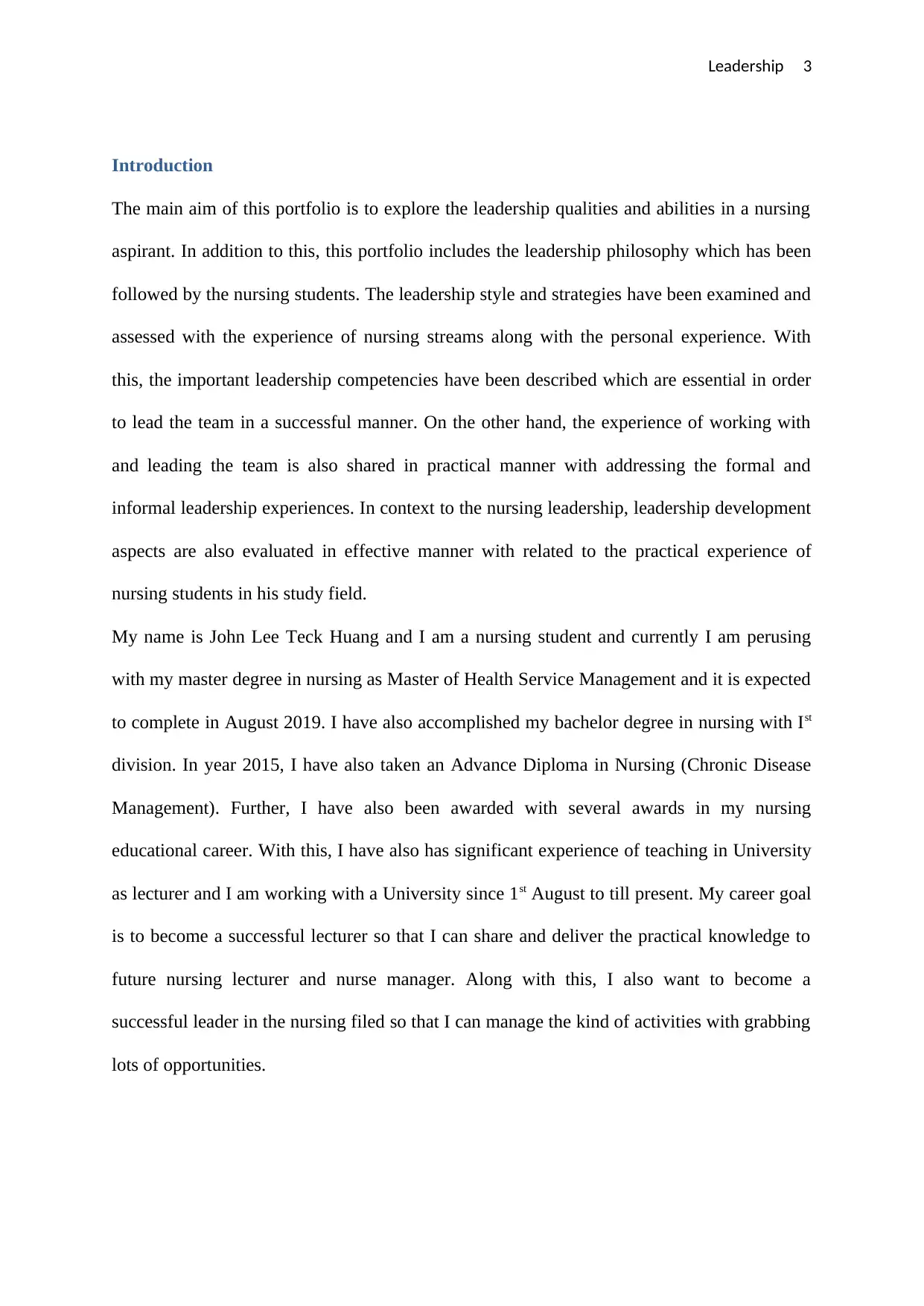
Leadership 3
Introduction
The main aim of this portfolio is to explore the leadership qualities and abilities in a nursing
aspirant. In addition to this, this portfolio includes the leadership philosophy which has been
followed by the nursing students. The leadership style and strategies have been examined and
assessed with the experience of nursing streams along with the personal experience. With
this, the important leadership competencies have been described which are essential in order
to lead the team in a successful manner. On the other hand, the experience of working with
and leading the team is also shared in practical manner with addressing the formal and
informal leadership experiences. In context to the nursing leadership, leadership development
aspects are also evaluated in effective manner with related to the practical experience of
nursing students in his study field.
My name is John Lee Teck Huang and I am a nursing student and currently I am perusing
with my master degree in nursing as Master of Health Service Management and it is expected
to complete in August 2019. I have also accomplished my bachelor degree in nursing with Ist
division. In year 2015, I have also taken an Advance Diploma in Nursing (Chronic Disease
Management). Further, I have also been awarded with several awards in my nursing
educational career. With this, I have also has significant experience of teaching in University
as lecturer and I am working with a University since 1st August to till present. My career goal
is to become a successful lecturer so that I can share and deliver the practical knowledge to
future nursing lecturer and nurse manager. Along with this, I also want to become a
successful leader in the nursing filed so that I can manage the kind of activities with grabbing
lots of opportunities.
Introduction
The main aim of this portfolio is to explore the leadership qualities and abilities in a nursing
aspirant. In addition to this, this portfolio includes the leadership philosophy which has been
followed by the nursing students. The leadership style and strategies have been examined and
assessed with the experience of nursing streams along with the personal experience. With
this, the important leadership competencies have been described which are essential in order
to lead the team in a successful manner. On the other hand, the experience of working with
and leading the team is also shared in practical manner with addressing the formal and
informal leadership experiences. In context to the nursing leadership, leadership development
aspects are also evaluated in effective manner with related to the practical experience of
nursing students in his study field.
My name is John Lee Teck Huang and I am a nursing student and currently I am perusing
with my master degree in nursing as Master of Health Service Management and it is expected
to complete in August 2019. I have also accomplished my bachelor degree in nursing with Ist
division. In year 2015, I have also taken an Advance Diploma in Nursing (Chronic Disease
Management). Further, I have also been awarded with several awards in my nursing
educational career. With this, I have also has significant experience of teaching in University
as lecturer and I am working with a University since 1st August to till present. My career goal
is to become a successful lecturer so that I can share and deliver the practical knowledge to
future nursing lecturer and nurse manager. Along with this, I also want to become a
successful leader in the nursing filed so that I can manage the kind of activities with grabbing
lots of opportunities.
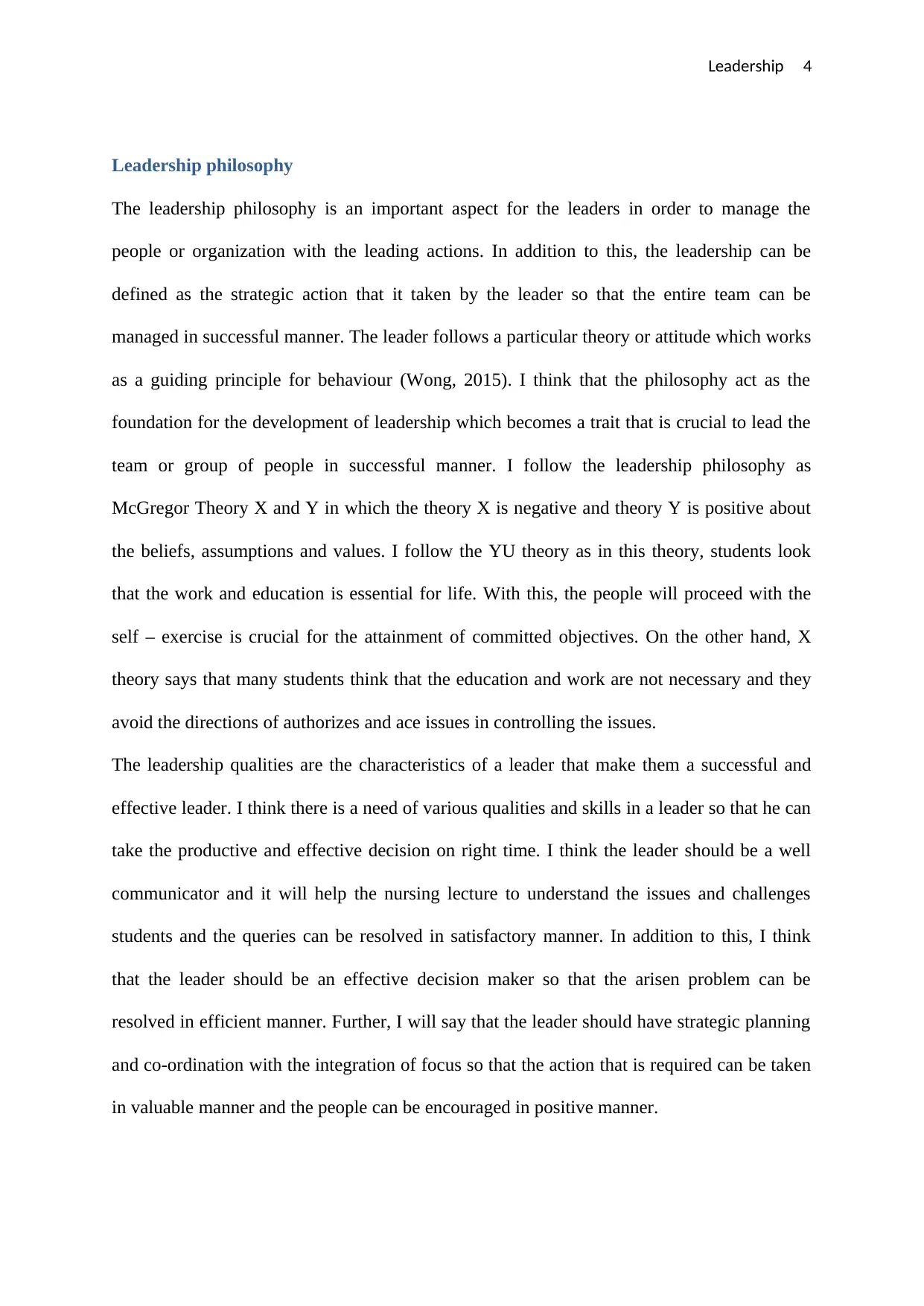
Leadership 4
Leadership philosophy
The leadership philosophy is an important aspect for the leaders in order to manage the
people or organization with the leading actions. In addition to this, the leadership can be
defined as the strategic action that it taken by the leader so that the entire team can be
managed in successful manner. The leader follows a particular theory or attitude which works
as a guiding principle for behaviour (Wong, 2015). I think that the philosophy act as the
foundation for the development of leadership which becomes a trait that is crucial to lead the
team or group of people in successful manner. I follow the leadership philosophy as
McGregor Theory X and Y in which the theory X is negative and theory Y is positive about
the beliefs, assumptions and values. I follow the YU theory as in this theory, students look
that the work and education is essential for life. With this, the people will proceed with the
self – exercise is crucial for the attainment of committed objectives. On the other hand, X
theory says that many students think that the education and work are not necessary and they
avoid the directions of authorizes and ace issues in controlling the issues.
The leadership qualities are the characteristics of a leader that make them a successful and
effective leader. I think there is a need of various qualities and skills in a leader so that he can
take the productive and effective decision on right time. I think the leader should be a well
communicator and it will help the nursing lecture to understand the issues and challenges
students and the queries can be resolved in satisfactory manner. In addition to this, I think
that the leader should be an effective decision maker so that the arisen problem can be
resolved in efficient manner. Further, I will say that the leader should have strategic planning
and co-ordination with the integration of focus so that the action that is required can be taken
in valuable manner and the people can be encouraged in positive manner.
Leadership philosophy
The leadership philosophy is an important aspect for the leaders in order to manage the
people or organization with the leading actions. In addition to this, the leadership can be
defined as the strategic action that it taken by the leader so that the entire team can be
managed in successful manner. The leader follows a particular theory or attitude which works
as a guiding principle for behaviour (Wong, 2015). I think that the philosophy act as the
foundation for the development of leadership which becomes a trait that is crucial to lead the
team or group of people in successful manner. I follow the leadership philosophy as
McGregor Theory X and Y in which the theory X is negative and theory Y is positive about
the beliefs, assumptions and values. I follow the YU theory as in this theory, students look
that the work and education is essential for life. With this, the people will proceed with the
self – exercise is crucial for the attainment of committed objectives. On the other hand, X
theory says that many students think that the education and work are not necessary and they
avoid the directions of authorizes and ace issues in controlling the issues.
The leadership qualities are the characteristics of a leader that make them a successful and
effective leader. I think there is a need of various qualities and skills in a leader so that he can
take the productive and effective decision on right time. I think the leader should be a well
communicator and it will help the nursing lecture to understand the issues and challenges
students and the queries can be resolved in satisfactory manner. In addition to this, I think
that the leader should be an effective decision maker so that the arisen problem can be
resolved in efficient manner. Further, I will say that the leader should have strategic planning
and co-ordination with the integration of focus so that the action that is required can be taken
in valuable manner and the people can be encouraged in positive manner.
Secure Best Marks with AI Grader
Need help grading? Try our AI Grader for instant feedback on your assignments.
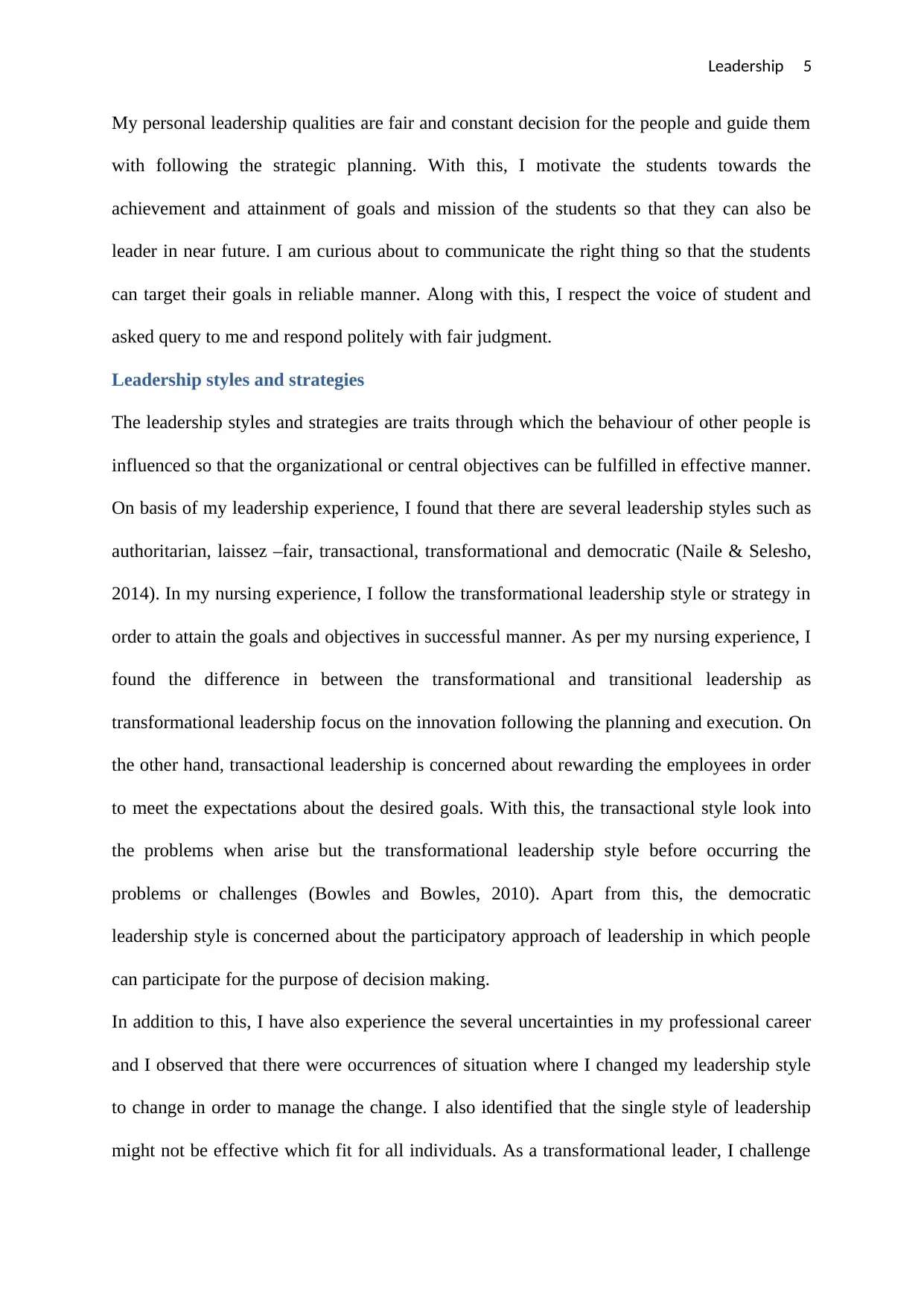
Leadership 5
My personal leadership qualities are fair and constant decision for the people and guide them
with following the strategic planning. With this, I motivate the students towards the
achievement and attainment of goals and mission of the students so that they can also be
leader in near future. I am curious about to communicate the right thing so that the students
can target their goals in reliable manner. Along with this, I respect the voice of student and
asked query to me and respond politely with fair judgment.
Leadership styles and strategies
The leadership styles and strategies are traits through which the behaviour of other people is
influenced so that the organizational or central objectives can be fulfilled in effective manner.
On basis of my leadership experience, I found that there are several leadership styles such as
authoritarian, laissez –fair, transactional, transformational and democratic (Naile & Selesho,
2014). In my nursing experience, I follow the transformational leadership style or strategy in
order to attain the goals and objectives in successful manner. As per my nursing experience, I
found the difference in between the transformational and transitional leadership as
transformational leadership focus on the innovation following the planning and execution. On
the other hand, transactional leadership is concerned about rewarding the employees in order
to meet the expectations about the desired goals. With this, the transactional style look into
the problems when arise but the transformational leadership style before occurring the
problems or challenges (Bowles and Bowles, 2010). Apart from this, the democratic
leadership style is concerned about the participatory approach of leadership in which people
can participate for the purpose of decision making.
In addition to this, I have also experience the several uncertainties in my professional career
and I observed that there were occurrences of situation where I changed my leadership style
to change in order to manage the change. I also identified that the single style of leadership
might not be effective which fit for all individuals. As a transformational leader, I challenge
My personal leadership qualities are fair and constant decision for the people and guide them
with following the strategic planning. With this, I motivate the students towards the
achievement and attainment of goals and mission of the students so that they can also be
leader in near future. I am curious about to communicate the right thing so that the students
can target their goals in reliable manner. Along with this, I respect the voice of student and
asked query to me and respond politely with fair judgment.
Leadership styles and strategies
The leadership styles and strategies are traits through which the behaviour of other people is
influenced so that the organizational or central objectives can be fulfilled in effective manner.
On basis of my leadership experience, I found that there are several leadership styles such as
authoritarian, laissez –fair, transactional, transformational and democratic (Naile & Selesho,
2014). In my nursing experience, I follow the transformational leadership style or strategy in
order to attain the goals and objectives in successful manner. As per my nursing experience, I
found the difference in between the transformational and transitional leadership as
transformational leadership focus on the innovation following the planning and execution. On
the other hand, transactional leadership is concerned about rewarding the employees in order
to meet the expectations about the desired goals. With this, the transactional style look into
the problems when arise but the transformational leadership style before occurring the
problems or challenges (Bowles and Bowles, 2010). Apart from this, the democratic
leadership style is concerned about the participatory approach of leadership in which people
can participate for the purpose of decision making.
In addition to this, I have also experience the several uncertainties in my professional career
and I observed that there were occurrences of situation where I changed my leadership style
to change in order to manage the change. I also identified that the single style of leadership
might not be effective which fit for all individuals. As a transformational leader, I challenge
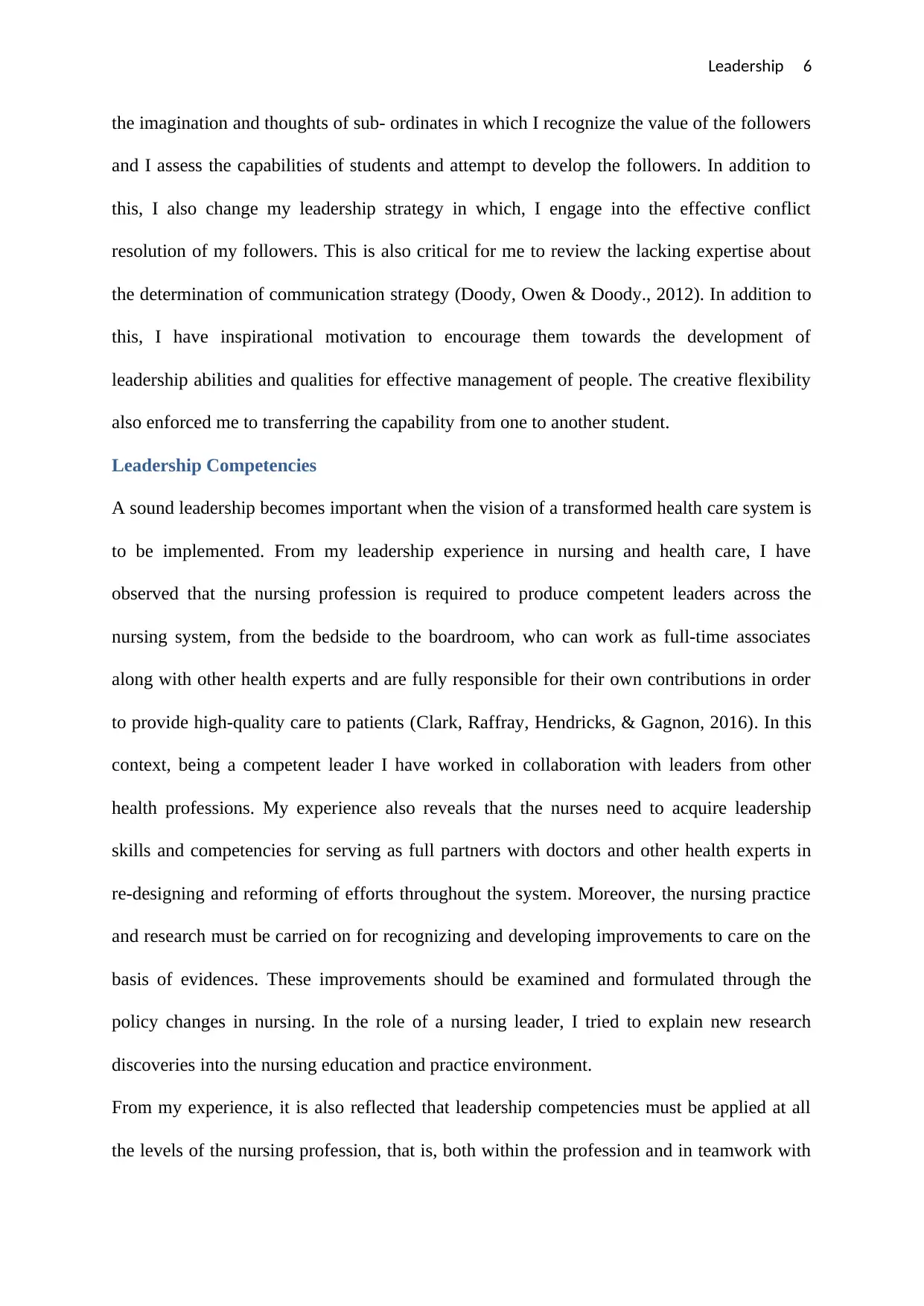
Leadership 6
the imagination and thoughts of sub- ordinates in which I recognize the value of the followers
and I assess the capabilities of students and attempt to develop the followers. In addition to
this, I also change my leadership strategy in which, I engage into the effective conflict
resolution of my followers. This is also critical for me to review the lacking expertise about
the determination of communication strategy (Doody, Owen & Doody., 2012). In addition to
this, I have inspirational motivation to encourage them towards the development of
leadership abilities and qualities for effective management of people. The creative flexibility
also enforced me to transferring the capability from one to another student.
Leadership Competencies
A sound leadership becomes important when the vision of a transformed health care system is
to be implemented. From my leadership experience in nursing and health care, I have
observed that the nursing profession is required to produce competent leaders across the
nursing system, from the bedside to the boardroom, who can work as full-time associates
along with other health experts and are fully responsible for their own contributions in order
to provide high-quality care to patients (Clark, Raffray, Hendricks, & Gagnon, 2016). In this
context, being a competent leader I have worked in collaboration with leaders from other
health professions. My experience also reveals that the nurses need to acquire leadership
skills and competencies for serving as full partners with doctors and other health experts in
re-designing and reforming of efforts throughout the system. Moreover, the nursing practice
and research must be carried on for recognizing and developing improvements to care on the
basis of evidences. These improvements should be examined and formulated through the
policy changes in nursing. In the role of a nursing leader, I tried to explain new research
discoveries into the nursing education and practice environment.
From my experience, it is also reflected that leadership competencies must be applied at all
the levels of the nursing profession, that is, both within the profession and in teamwork with
the imagination and thoughts of sub- ordinates in which I recognize the value of the followers
and I assess the capabilities of students and attempt to develop the followers. In addition to
this, I also change my leadership strategy in which, I engage into the effective conflict
resolution of my followers. This is also critical for me to review the lacking expertise about
the determination of communication strategy (Doody, Owen & Doody., 2012). In addition to
this, I have inspirational motivation to encourage them towards the development of
leadership abilities and qualities for effective management of people. The creative flexibility
also enforced me to transferring the capability from one to another student.
Leadership Competencies
A sound leadership becomes important when the vision of a transformed health care system is
to be implemented. From my leadership experience in nursing and health care, I have
observed that the nursing profession is required to produce competent leaders across the
nursing system, from the bedside to the boardroom, who can work as full-time associates
along with other health experts and are fully responsible for their own contributions in order
to provide high-quality care to patients (Clark, Raffray, Hendricks, & Gagnon, 2016). In this
context, being a competent leader I have worked in collaboration with leaders from other
health professions. My experience also reveals that the nurses need to acquire leadership
skills and competencies for serving as full partners with doctors and other health experts in
re-designing and reforming of efforts throughout the system. Moreover, the nursing practice
and research must be carried on for recognizing and developing improvements to care on the
basis of evidences. These improvements should be examined and formulated through the
policy changes in nursing. In the role of a nursing leader, I tried to explain new research
discoveries into the nursing education and practice environment.
From my experience, it is also reflected that leadership competencies must be applied at all
the levels of the nursing profession, that is, both within the profession and in teamwork with
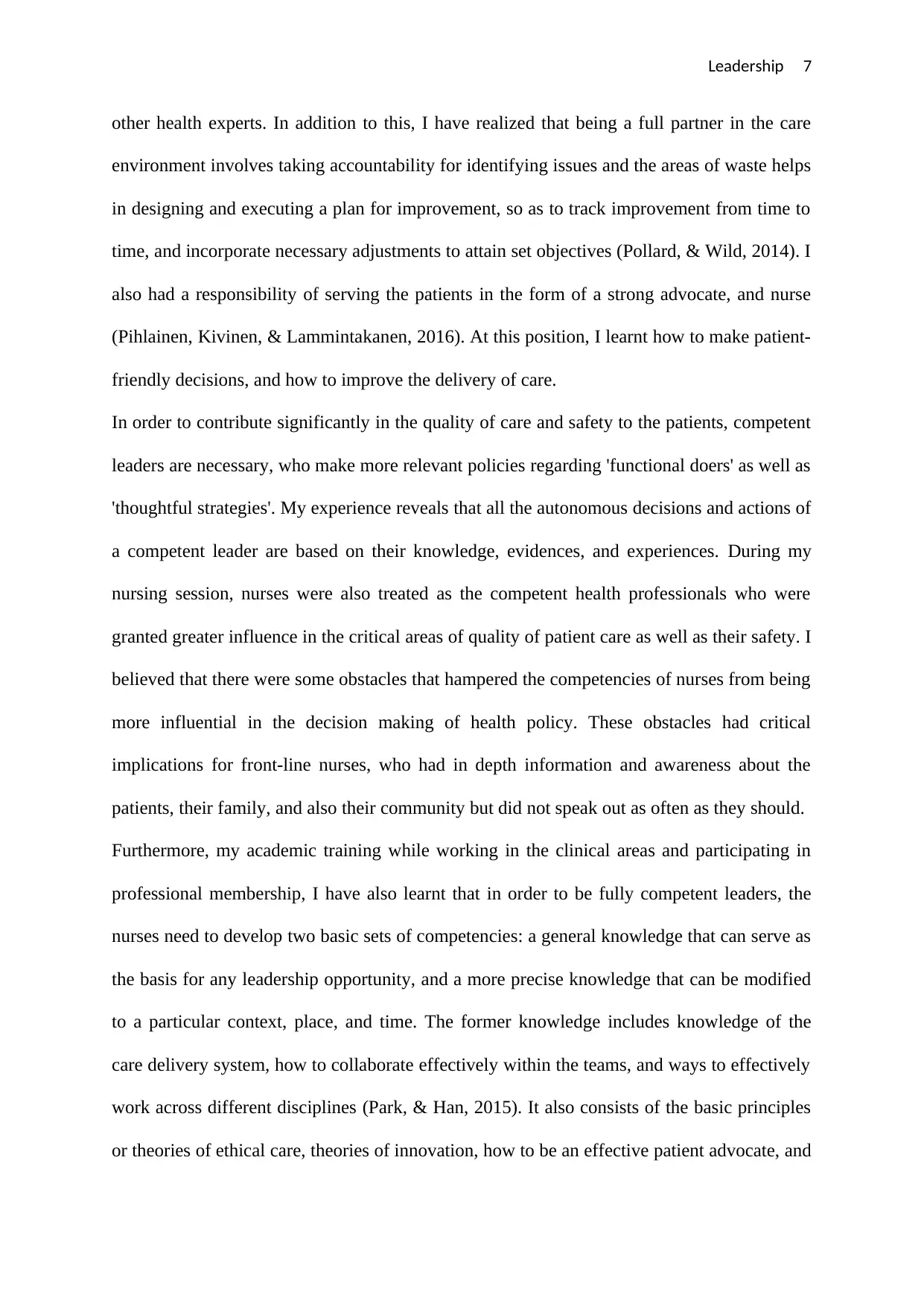
Leadership 7
other health experts. In addition to this, I have realized that being a full partner in the care
environment involves taking accountability for identifying issues and the areas of waste helps
in designing and executing a plan for improvement, so as to track improvement from time to
time, and incorporate necessary adjustments to attain set objectives (Pollard, & Wild, 2014). I
also had a responsibility of serving the patients in the form of a strong advocate, and nurse
(Pihlainen, Kivinen, & Lammintakanen, 2016). At this position, I learnt how to make patient-
friendly decisions, and how to improve the delivery of care.
In order to contribute significantly in the quality of care and safety to the patients, competent
leaders are necessary, who make more relevant policies regarding 'functional doers' as well as
'thoughtful strategies'. My experience reveals that all the autonomous decisions and actions of
a competent leader are based on their knowledge, evidences, and experiences. During my
nursing session, nurses were also treated as the competent health professionals who were
granted greater influence in the critical areas of quality of patient care as well as their safety. I
believed that there were some obstacles that hampered the competencies of nurses from being
more influential in the decision making of health policy. These obstacles had critical
implications for front-line nurses, who had in depth information and awareness about the
patients, their family, and also their community but did not speak out as often as they should.
Furthermore, my academic training while working in the clinical areas and participating in
professional membership, I have also learnt that in order to be fully competent leaders, the
nurses need to develop two basic sets of competencies: a general knowledge that can serve as
the basis for any leadership opportunity, and a more precise knowledge that can be modified
to a particular context, place, and time. The former knowledge includes knowledge of the
care delivery system, how to collaborate effectively within the teams, and ways to effectively
work across different disciplines (Park, & Han, 2015). It also consists of the basic principles
or theories of ethical care, theories of innovation, how to be an effective patient advocate, and
other health experts. In addition to this, I have realized that being a full partner in the care
environment involves taking accountability for identifying issues and the areas of waste helps
in designing and executing a plan for improvement, so as to track improvement from time to
time, and incorporate necessary adjustments to attain set objectives (Pollard, & Wild, 2014). I
also had a responsibility of serving the patients in the form of a strong advocate, and nurse
(Pihlainen, Kivinen, & Lammintakanen, 2016). At this position, I learnt how to make patient-
friendly decisions, and how to improve the delivery of care.
In order to contribute significantly in the quality of care and safety to the patients, competent
leaders are necessary, who make more relevant policies regarding 'functional doers' as well as
'thoughtful strategies'. My experience reveals that all the autonomous decisions and actions of
a competent leader are based on their knowledge, evidences, and experiences. During my
nursing session, nurses were also treated as the competent health professionals who were
granted greater influence in the critical areas of quality of patient care as well as their safety. I
believed that there were some obstacles that hampered the competencies of nurses from being
more influential in the decision making of health policy. These obstacles had critical
implications for front-line nurses, who had in depth information and awareness about the
patients, their family, and also their community but did not speak out as often as they should.
Furthermore, my academic training while working in the clinical areas and participating in
professional membership, I have also learnt that in order to be fully competent leaders, the
nurses need to develop two basic sets of competencies: a general knowledge that can serve as
the basis for any leadership opportunity, and a more precise knowledge that can be modified
to a particular context, place, and time. The former knowledge includes knowledge of the
care delivery system, how to collaborate effectively within the teams, and ways to effectively
work across different disciplines (Park, & Han, 2015). It also consists of the basic principles
or theories of ethical care, theories of innovation, how to be an effective patient advocate, and
Paraphrase This Document
Need a fresh take? Get an instant paraphrase of this document with our AI Paraphraser
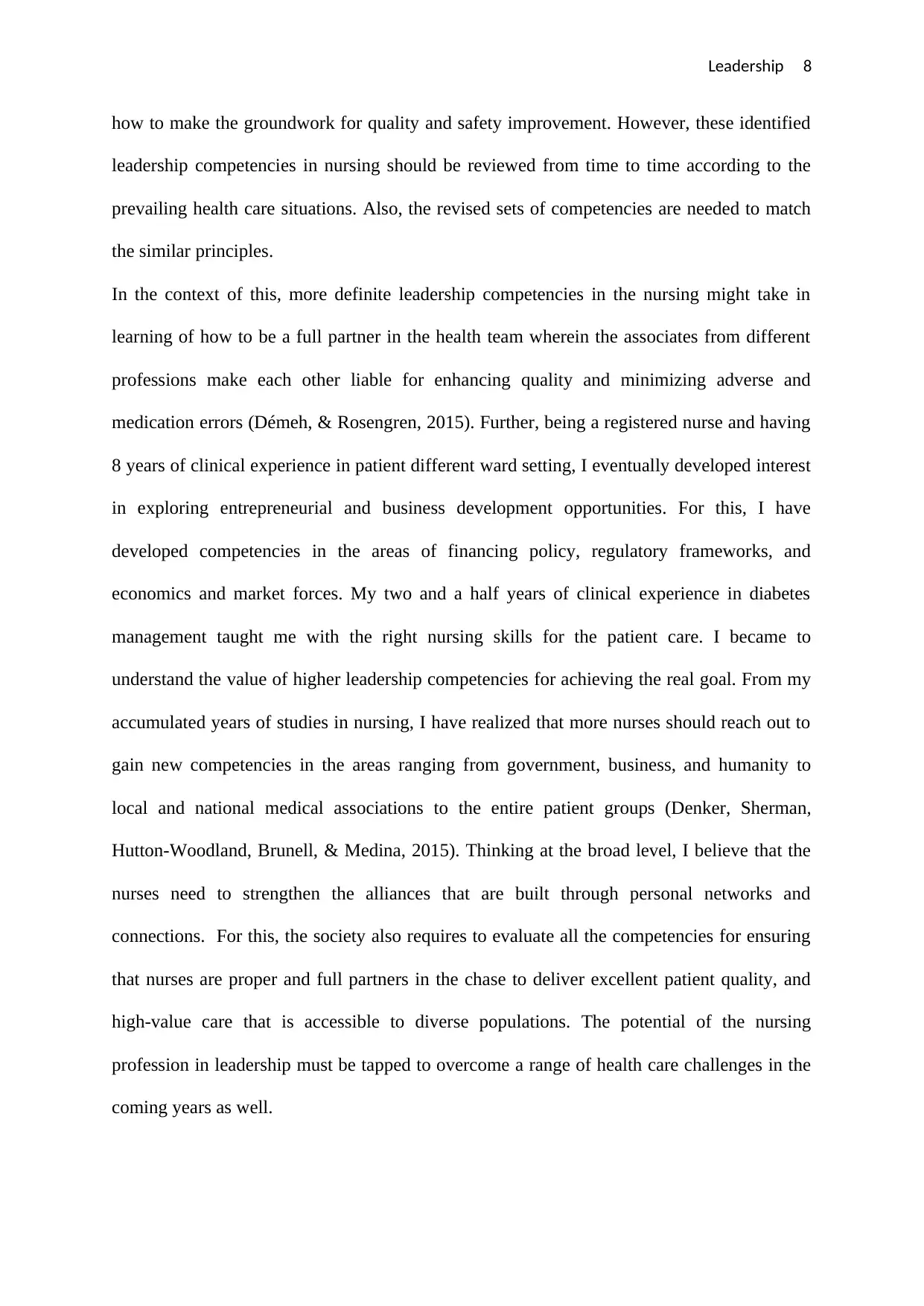
Leadership 8
how to make the groundwork for quality and safety improvement. However, these identified
leadership competencies in nursing should be reviewed from time to time according to the
prevailing health care situations. Also, the revised sets of competencies are needed to match
the similar principles.
In the context of this, more definite leadership competencies in the nursing might take in
learning of how to be a full partner in the health team wherein the associates from different
professions make each other liable for enhancing quality and minimizing adverse and
medication errors (Démeh, & Rosengren, 2015). Further, being a registered nurse and having
8 years of clinical experience in patient different ward setting, I eventually developed interest
in exploring entrepreneurial and business development opportunities. For this, I have
developed competencies in the areas of financing policy, regulatory frameworks, and
economics and market forces. My two and a half years of clinical experience in diabetes
management taught me with the right nursing skills for the patient care. I became to
understand the value of higher leadership competencies for achieving the real goal. From my
accumulated years of studies in nursing, I have realized that more nurses should reach out to
gain new competencies in the areas ranging from government, business, and humanity to
local and national medical associations to the entire patient groups (Denker, Sherman,
Hutton-Woodland, Brunell, & Medina, 2015). Thinking at the broad level, I believe that the
nurses need to strengthen the alliances that are built through personal networks and
connections. For this, the society also requires to evaluate all the competencies for ensuring
that nurses are proper and full partners in the chase to deliver excellent patient quality, and
high-value care that is accessible to diverse populations. The potential of the nursing
profession in leadership must be tapped to overcome a range of health care challenges in the
coming years as well.
how to make the groundwork for quality and safety improvement. However, these identified
leadership competencies in nursing should be reviewed from time to time according to the
prevailing health care situations. Also, the revised sets of competencies are needed to match
the similar principles.
In the context of this, more definite leadership competencies in the nursing might take in
learning of how to be a full partner in the health team wherein the associates from different
professions make each other liable for enhancing quality and minimizing adverse and
medication errors (Démeh, & Rosengren, 2015). Further, being a registered nurse and having
8 years of clinical experience in patient different ward setting, I eventually developed interest
in exploring entrepreneurial and business development opportunities. For this, I have
developed competencies in the areas of financing policy, regulatory frameworks, and
economics and market forces. My two and a half years of clinical experience in diabetes
management taught me with the right nursing skills for the patient care. I became to
understand the value of higher leadership competencies for achieving the real goal. From my
accumulated years of studies in nursing, I have realized that more nurses should reach out to
gain new competencies in the areas ranging from government, business, and humanity to
local and national medical associations to the entire patient groups (Denker, Sherman,
Hutton-Woodland, Brunell, & Medina, 2015). Thinking at the broad level, I believe that the
nurses need to strengthen the alliances that are built through personal networks and
connections. For this, the society also requires to evaluate all the competencies for ensuring
that nurses are proper and full partners in the chase to deliver excellent patient quality, and
high-value care that is accessible to diverse populations. The potential of the nursing
profession in leadership must be tapped to overcome a range of health care challenges in the
coming years as well.
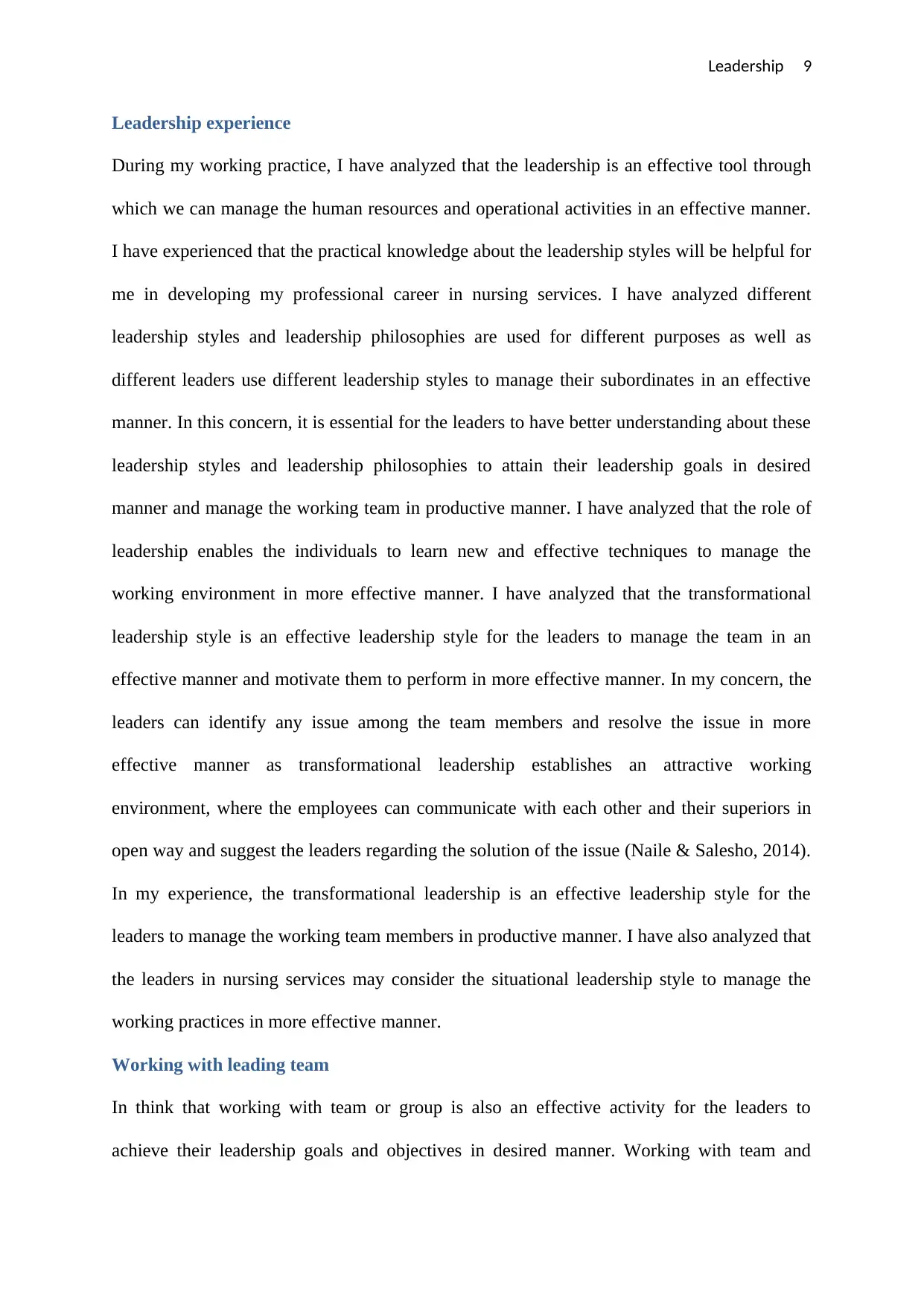
Leadership 9
Leadership experience
During my working practice, I have analyzed that the leadership is an effective tool through
which we can manage the human resources and operational activities in an effective manner.
I have experienced that the practical knowledge about the leadership styles will be helpful for
me in developing my professional career in nursing services. I have analyzed different
leadership styles and leadership philosophies are used for different purposes as well as
different leaders use different leadership styles to manage their subordinates in an effective
manner. In this concern, it is essential for the leaders to have better understanding about these
leadership styles and leadership philosophies to attain their leadership goals in desired
manner and manage the working team in productive manner. I have analyzed that the role of
leadership enables the individuals to learn new and effective techniques to manage the
working environment in more effective manner. I have analyzed that the transformational
leadership style is an effective leadership style for the leaders to manage the team in an
effective manner and motivate them to perform in more effective manner. In my concern, the
leaders can identify any issue among the team members and resolve the issue in more
effective manner as transformational leadership establishes an attractive working
environment, where the employees can communicate with each other and their superiors in
open way and suggest the leaders regarding the solution of the issue (Naile & Salesho, 2014).
In my experience, the transformational leadership is an effective leadership style for the
leaders to manage the working team members in productive manner. I have also analyzed that
the leaders in nursing services may consider the situational leadership style to manage the
working practices in more effective manner.
Working with leading team
In think that working with team or group is also an effective activity for the leaders to
achieve their leadership goals and objectives in desired manner. Working with team and
Leadership experience
During my working practice, I have analyzed that the leadership is an effective tool through
which we can manage the human resources and operational activities in an effective manner.
I have experienced that the practical knowledge about the leadership styles will be helpful for
me in developing my professional career in nursing services. I have analyzed different
leadership styles and leadership philosophies are used for different purposes as well as
different leaders use different leadership styles to manage their subordinates in an effective
manner. In this concern, it is essential for the leaders to have better understanding about these
leadership styles and leadership philosophies to attain their leadership goals in desired
manner and manage the working team in productive manner. I have analyzed that the role of
leadership enables the individuals to learn new and effective techniques to manage the
working environment in more effective manner. I have analyzed that the transformational
leadership style is an effective leadership style for the leaders to manage the team in an
effective manner and motivate them to perform in more effective manner. In my concern, the
leaders can identify any issue among the team members and resolve the issue in more
effective manner as transformational leadership establishes an attractive working
environment, where the employees can communicate with each other and their superiors in
open way and suggest the leaders regarding the solution of the issue (Naile & Salesho, 2014).
In my experience, the transformational leadership is an effective leadership style for the
leaders to manage the working team members in productive manner. I have also analyzed that
the leaders in nursing services may consider the situational leadership style to manage the
working practices in more effective manner.
Working with leading team
In think that working with team or group is also an effective activity for the leaders to
achieve their leadership goals and objectives in desired manner. Working with team and
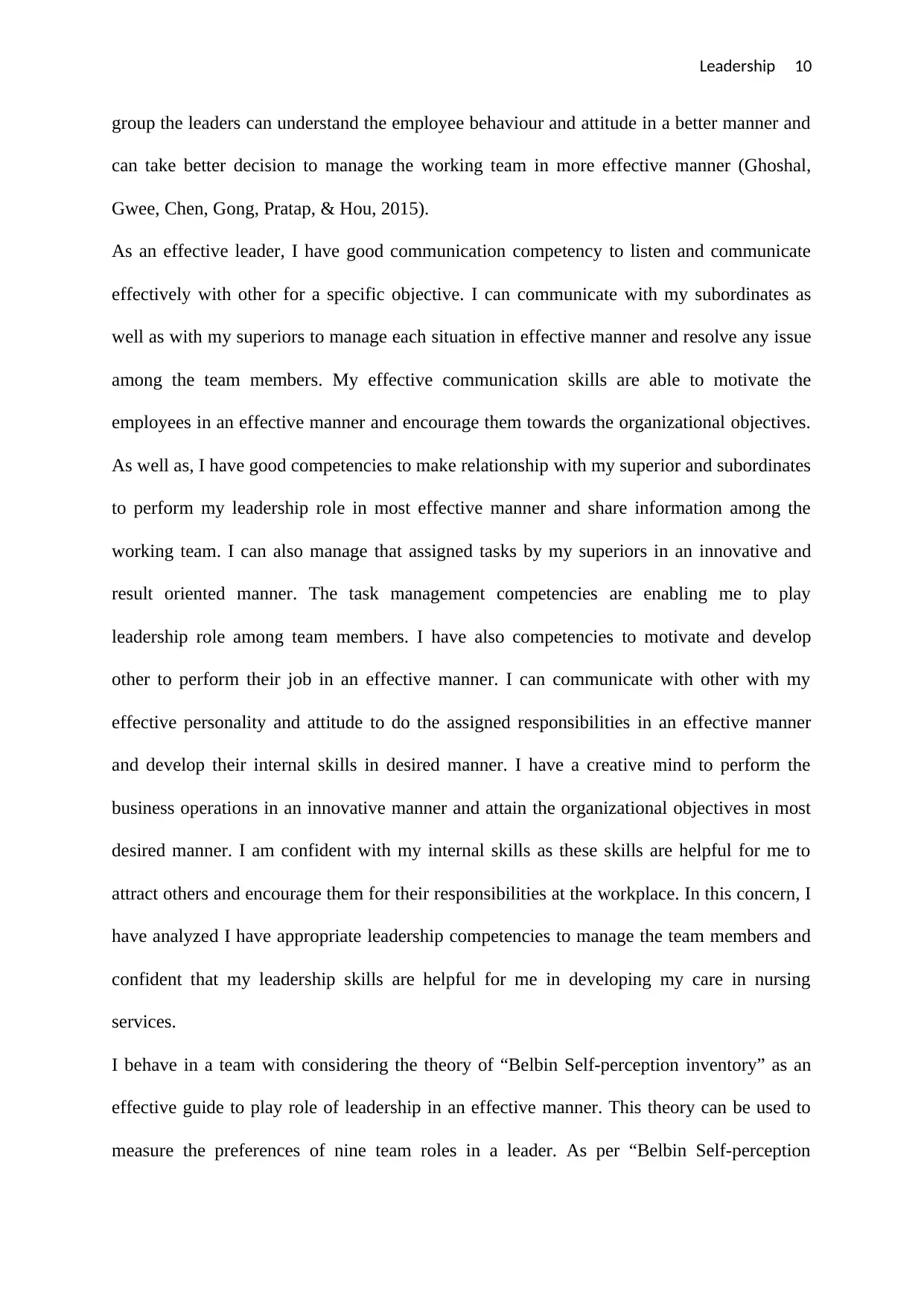
Leadership 10
group the leaders can understand the employee behaviour and attitude in a better manner and
can take better decision to manage the working team in more effective manner (Ghoshal,
Gwee, Chen, Gong, Pratap, & Hou, 2015).
As an effective leader, I have good communication competency to listen and communicate
effectively with other for a specific objective. I can communicate with my subordinates as
well as with my superiors to manage each situation in effective manner and resolve any issue
among the team members. My effective communication skills are able to motivate the
employees in an effective manner and encourage them towards the organizational objectives.
As well as, I have good competencies to make relationship with my superior and subordinates
to perform my leadership role in most effective manner and share information among the
working team. I can also manage that assigned tasks by my superiors in an innovative and
result oriented manner. The task management competencies are enabling me to play
leadership role among team members. I have also competencies to motivate and develop
other to perform their job in an effective manner. I can communicate with other with my
effective personality and attitude to do the assigned responsibilities in an effective manner
and develop their internal skills in desired manner. I have a creative mind to perform the
business operations in an innovative manner and attain the organizational objectives in most
desired manner. I am confident with my internal skills as these skills are helpful for me to
attract others and encourage them for their responsibilities at the workplace. In this concern, I
have analyzed I have appropriate leadership competencies to manage the team members and
confident that my leadership skills are helpful for me in developing my care in nursing
services.
I behave in a team with considering the theory of “Belbin Self-perception inventory” as an
effective guide to play role of leadership in an effective manner. This theory can be used to
measure the preferences of nine team roles in a leader. As per “Belbin Self-perception
group the leaders can understand the employee behaviour and attitude in a better manner and
can take better decision to manage the working team in more effective manner (Ghoshal,
Gwee, Chen, Gong, Pratap, & Hou, 2015).
As an effective leader, I have good communication competency to listen and communicate
effectively with other for a specific objective. I can communicate with my subordinates as
well as with my superiors to manage each situation in effective manner and resolve any issue
among the team members. My effective communication skills are able to motivate the
employees in an effective manner and encourage them towards the organizational objectives.
As well as, I have good competencies to make relationship with my superior and subordinates
to perform my leadership role in most effective manner and share information among the
working team. I can also manage that assigned tasks by my superiors in an innovative and
result oriented manner. The task management competencies are enabling me to play
leadership role among team members. I have also competencies to motivate and develop
other to perform their job in an effective manner. I can communicate with other with my
effective personality and attitude to do the assigned responsibilities in an effective manner
and develop their internal skills in desired manner. I have a creative mind to perform the
business operations in an innovative manner and attain the organizational objectives in most
desired manner. I am confident with my internal skills as these skills are helpful for me to
attract others and encourage them for their responsibilities at the workplace. In this concern, I
have analyzed I have appropriate leadership competencies to manage the team members and
confident that my leadership skills are helpful for me in developing my care in nursing
services.
I behave in a team with considering the theory of “Belbin Self-perception inventory” as an
effective guide to play role of leadership in an effective manner. This theory can be used to
measure the preferences of nine team roles in a leader. As per “Belbin Self-perception
Secure Best Marks with AI Grader
Need help grading? Try our AI Grader for instant feedback on your assignments.
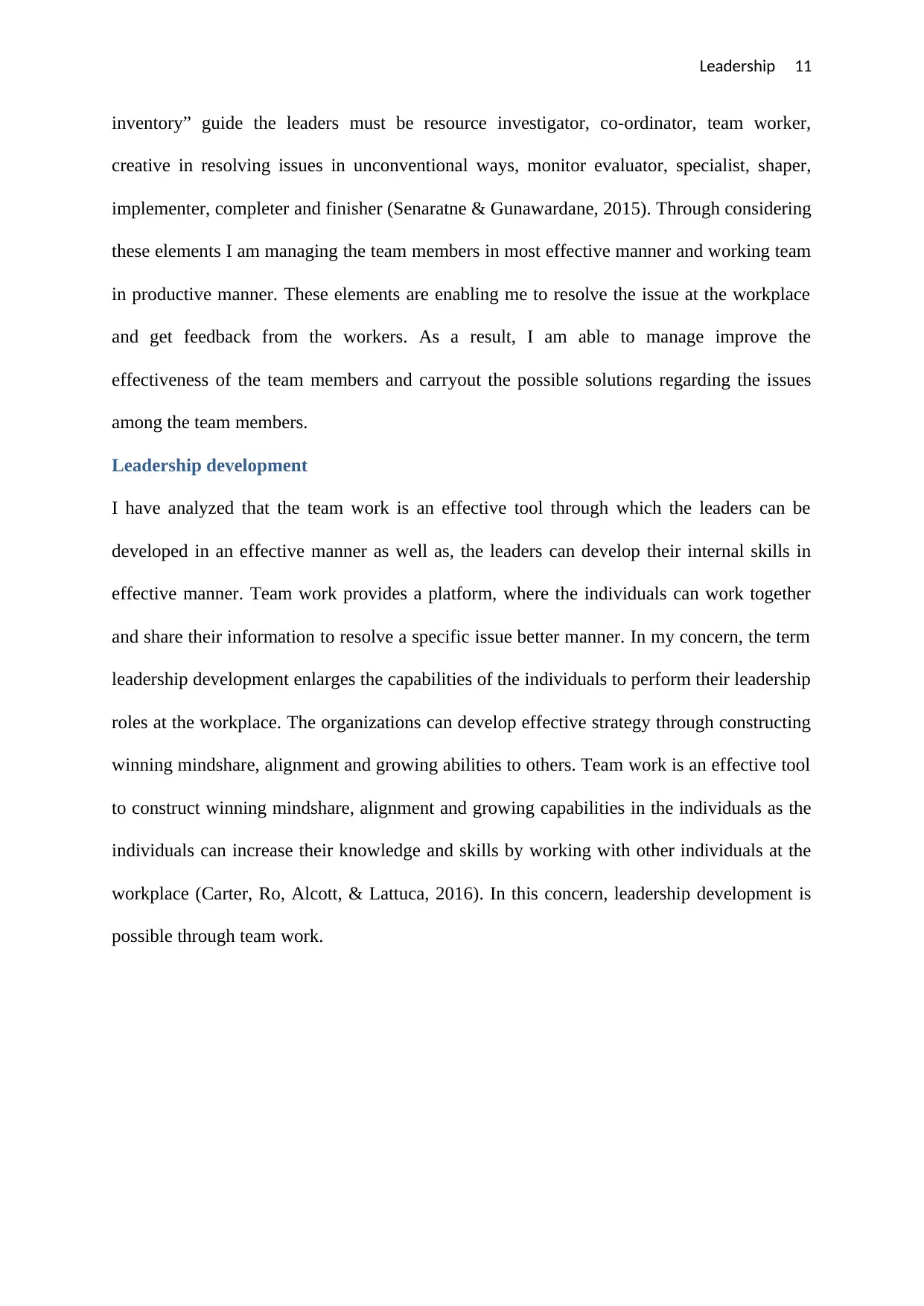
Leadership 11
inventory” guide the leaders must be resource investigator, co-ordinator, team worker,
creative in resolving issues in unconventional ways, monitor evaluator, specialist, shaper,
implementer, completer and finisher (Senaratne & Gunawardane, 2015). Through considering
these elements I am managing the team members in most effective manner and working team
in productive manner. These elements are enabling me to resolve the issue at the workplace
and get feedback from the workers. As a result, I am able to manage improve the
effectiveness of the team members and carryout the possible solutions regarding the issues
among the team members.
Leadership development
I have analyzed that the team work is an effective tool through which the leaders can be
developed in an effective manner as well as, the leaders can develop their internal skills in
effective manner. Team work provides a platform, where the individuals can work together
and share their information to resolve a specific issue better manner. In my concern, the term
leadership development enlarges the capabilities of the individuals to perform their leadership
roles at the workplace. The organizations can develop effective strategy through constructing
winning mindshare, alignment and growing abilities to others. Team work is an effective tool
to construct winning mindshare, alignment and growing capabilities in the individuals as the
individuals can increase their knowledge and skills by working with other individuals at the
workplace (Carter, Ro, Alcott, & Lattuca, 2016). In this concern, leadership development is
possible through team work.
inventory” guide the leaders must be resource investigator, co-ordinator, team worker,
creative in resolving issues in unconventional ways, monitor evaluator, specialist, shaper,
implementer, completer and finisher (Senaratne & Gunawardane, 2015). Through considering
these elements I am managing the team members in most effective manner and working team
in productive manner. These elements are enabling me to resolve the issue at the workplace
and get feedback from the workers. As a result, I am able to manage improve the
effectiveness of the team members and carryout the possible solutions regarding the issues
among the team members.
Leadership development
I have analyzed that the team work is an effective tool through which the leaders can be
developed in an effective manner as well as, the leaders can develop their internal skills in
effective manner. Team work provides a platform, where the individuals can work together
and share their information to resolve a specific issue better manner. In my concern, the term
leadership development enlarges the capabilities of the individuals to perform their leadership
roles at the workplace. The organizations can develop effective strategy through constructing
winning mindshare, alignment and growing abilities to others. Team work is an effective tool
to construct winning mindshare, alignment and growing capabilities in the individuals as the
individuals can increase their knowledge and skills by working with other individuals at the
workplace (Carter, Ro, Alcott, & Lattuca, 2016). In this concern, leadership development is
possible through team work.
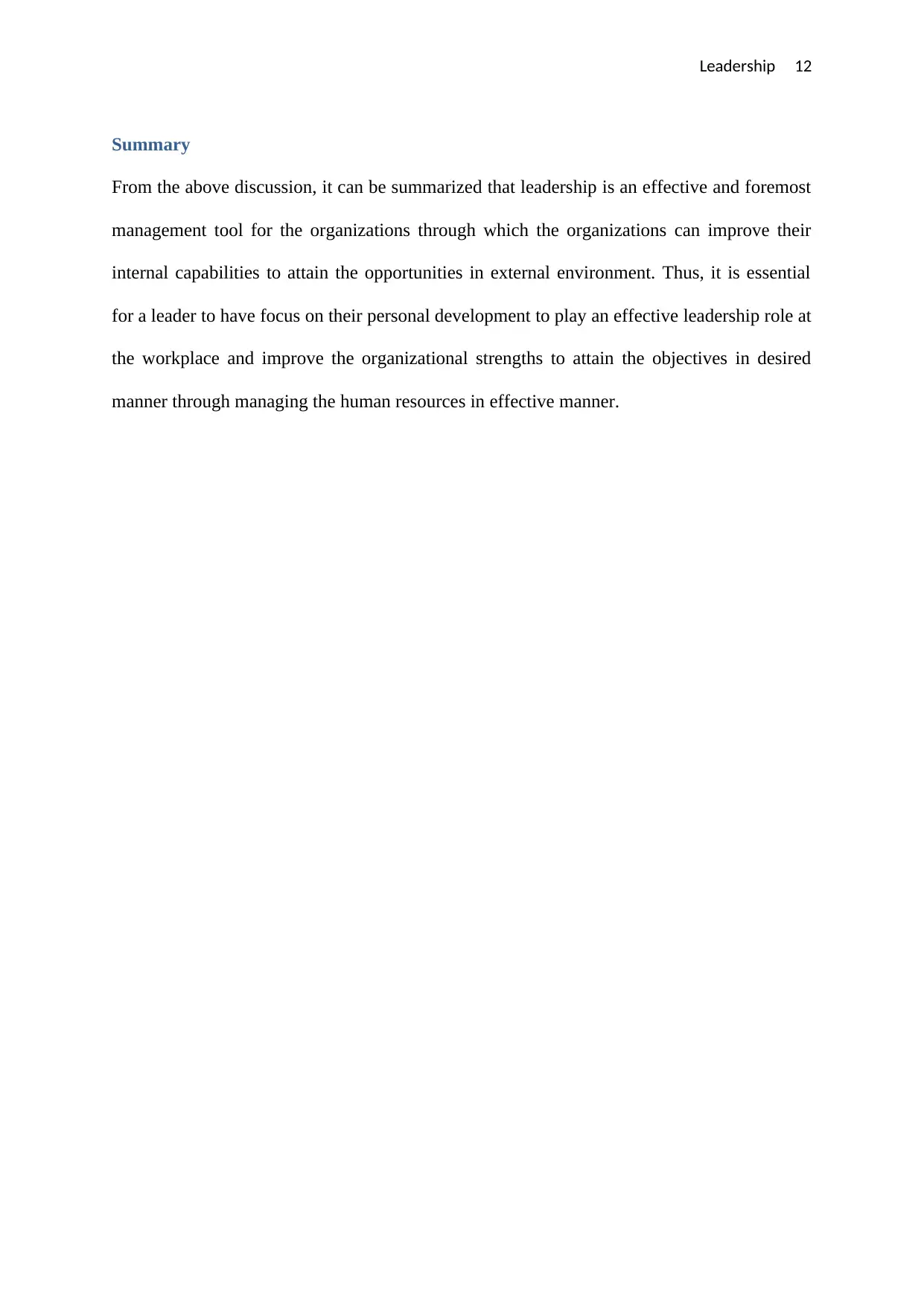
Leadership 12
Summary
From the above discussion, it can be summarized that leadership is an effective and foremost
management tool for the organizations through which the organizations can improve their
internal capabilities to attain the opportunities in external environment. Thus, it is essential
for a leader to have focus on their personal development to play an effective leadership role at
the workplace and improve the organizational strengths to attain the objectives in desired
manner through managing the human resources in effective manner.
Summary
From the above discussion, it can be summarized that leadership is an effective and foremost
management tool for the organizations through which the organizations can improve their
internal capabilities to attain the opportunities in external environment. Thus, it is essential
for a leader to have focus on their personal development to play an effective leadership role at
the workplace and improve the organizational strengths to attain the objectives in desired
manner through managing the human resources in effective manner.
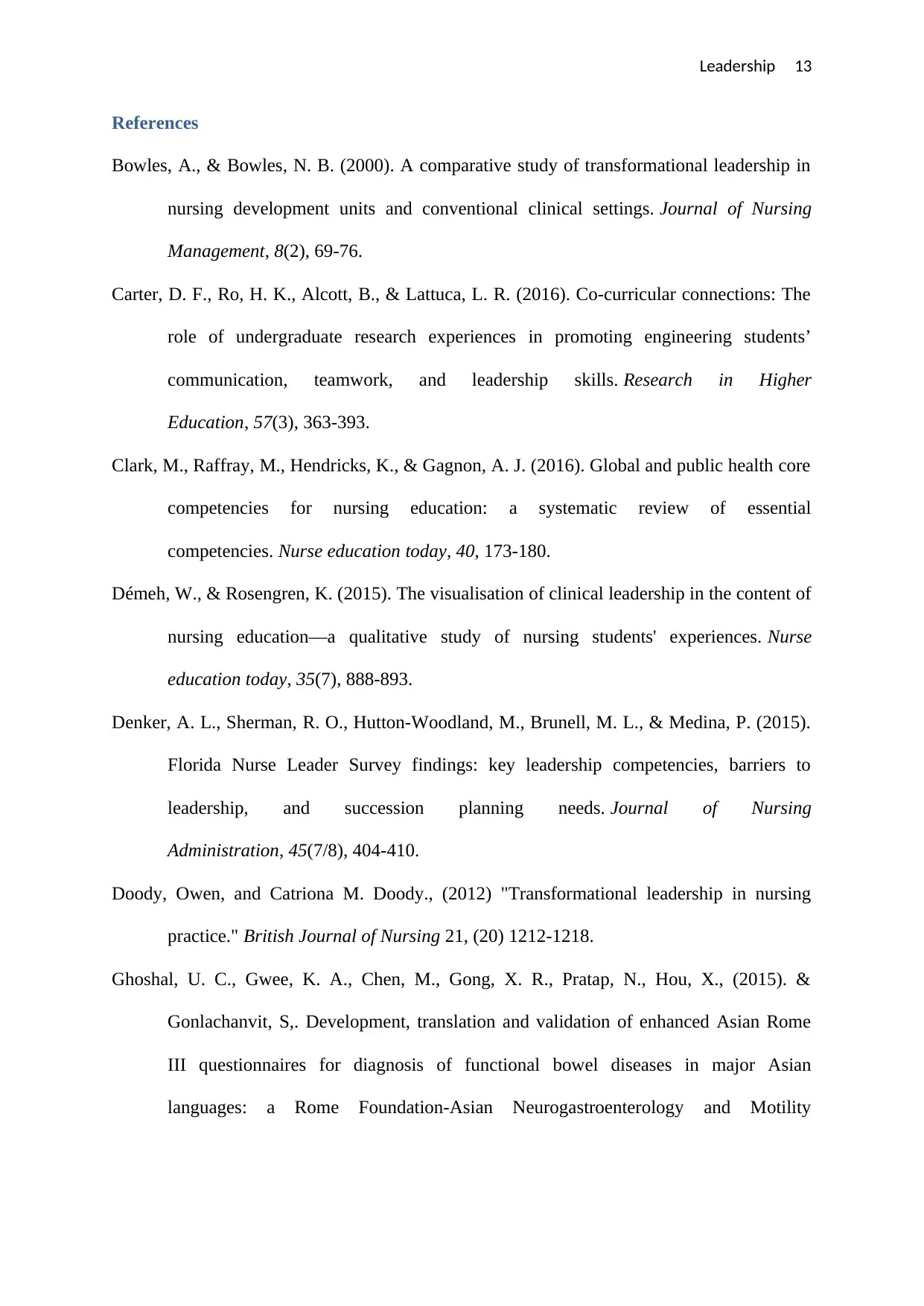
Leadership 13
References
Bowles, A., & Bowles, N. B. (2000). A comparative study of transformational leadership in
nursing development units and conventional clinical settings. Journal of Nursing
Management, 8(2), 69-76.
Carter, D. F., Ro, H. K., Alcott, B., & Lattuca, L. R. (2016). Co-curricular connections: The
role of undergraduate research experiences in promoting engineering students’
communication, teamwork, and leadership skills. Research in Higher
Education, 57(3), 363-393.
Clark, M., Raffray, M., Hendricks, K., & Gagnon, A. J. (2016). Global and public health core
competencies for nursing education: a systematic review of essential
competencies. Nurse education today, 40, 173-180.
Démeh, W., & Rosengren, K. (2015). The visualisation of clinical leadership in the content of
nursing education—a qualitative study of nursing students' experiences. Nurse
education today, 35(7), 888-893.
Denker, A. L., Sherman, R. O., Hutton-Woodland, M., Brunell, M. L., & Medina, P. (2015).
Florida Nurse Leader Survey findings: key leadership competencies, barriers to
leadership, and succession planning needs. Journal of Nursing
Administration, 45(7/8), 404-410.
Doody, Owen, and Catriona M. Doody., (2012) "Transformational leadership in nursing
practice." British Journal of Nursing 21, (20) 1212-1218.
Ghoshal, U. C., Gwee, K. A., Chen, M., Gong, X. R., Pratap, N., Hou, X., (2015). &
Gonlachanvit, S,. Development, translation and validation of enhanced Asian Rome
III questionnaires for diagnosis of functional bowel diseases in major Asian
languages: a Rome Foundation-Asian Neurogastroenterology and Motility
References
Bowles, A., & Bowles, N. B. (2000). A comparative study of transformational leadership in
nursing development units and conventional clinical settings. Journal of Nursing
Management, 8(2), 69-76.
Carter, D. F., Ro, H. K., Alcott, B., & Lattuca, L. R. (2016). Co-curricular connections: The
role of undergraduate research experiences in promoting engineering students’
communication, teamwork, and leadership skills. Research in Higher
Education, 57(3), 363-393.
Clark, M., Raffray, M., Hendricks, K., & Gagnon, A. J. (2016). Global and public health core
competencies for nursing education: a systematic review of essential
competencies. Nurse education today, 40, 173-180.
Démeh, W., & Rosengren, K. (2015). The visualisation of clinical leadership in the content of
nursing education—a qualitative study of nursing students' experiences. Nurse
education today, 35(7), 888-893.
Denker, A. L., Sherman, R. O., Hutton-Woodland, M., Brunell, M. L., & Medina, P. (2015).
Florida Nurse Leader Survey findings: key leadership competencies, barriers to
leadership, and succession planning needs. Journal of Nursing
Administration, 45(7/8), 404-410.
Doody, Owen, and Catriona M. Doody., (2012) "Transformational leadership in nursing
practice." British Journal of Nursing 21, (20) 1212-1218.
Ghoshal, U. C., Gwee, K. A., Chen, M., Gong, X. R., Pratap, N., Hou, X., (2015). &
Gonlachanvit, S,. Development, translation and validation of enhanced Asian Rome
III questionnaires for diagnosis of functional bowel diseases in major Asian
languages: a Rome Foundation-Asian Neurogastroenterology and Motility
Paraphrase This Document
Need a fresh take? Get an instant paraphrase of this document with our AI Paraphraser
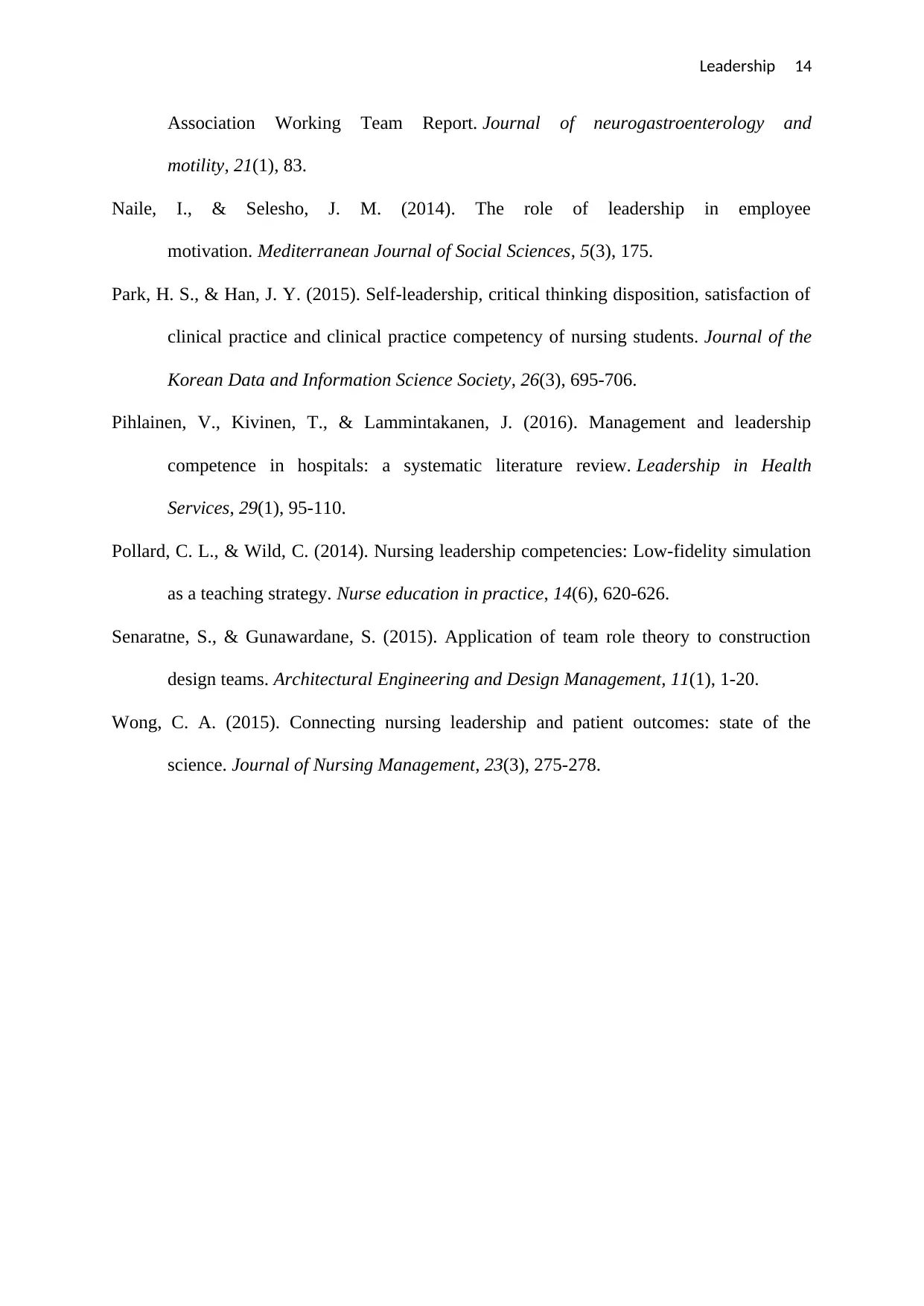
Leadership 14
Association Working Team Report. Journal of neurogastroenterology and
motility, 21(1), 83.
Naile, I., & Selesho, J. M. (2014). The role of leadership in employee
motivation. Mediterranean Journal of Social Sciences, 5(3), 175.
Park, H. S., & Han, J. Y. (2015). Self-leadership, critical thinking disposition, satisfaction of
clinical practice and clinical practice competency of nursing students. Journal of the
Korean Data and Information Science Society, 26(3), 695-706.
Pihlainen, V., Kivinen, T., & Lammintakanen, J. (2016). Management and leadership
competence in hospitals: a systematic literature review. Leadership in Health
Services, 29(1), 95-110.
Pollard, C. L., & Wild, C. (2014). Nursing leadership competencies: Low-fidelity simulation
as a teaching strategy. Nurse education in practice, 14(6), 620-626.
Senaratne, S., & Gunawardane, S. (2015). Application of team role theory to construction
design teams. Architectural Engineering and Design Management, 11(1), 1-20.
Wong, C. A. (2015). Connecting nursing leadership and patient outcomes: state of the
science. Journal of Nursing Management, 23(3), 275-278.
Association Working Team Report. Journal of neurogastroenterology and
motility, 21(1), 83.
Naile, I., & Selesho, J. M. (2014). The role of leadership in employee
motivation. Mediterranean Journal of Social Sciences, 5(3), 175.
Park, H. S., & Han, J. Y. (2015). Self-leadership, critical thinking disposition, satisfaction of
clinical practice and clinical practice competency of nursing students. Journal of the
Korean Data and Information Science Society, 26(3), 695-706.
Pihlainen, V., Kivinen, T., & Lammintakanen, J. (2016). Management and leadership
competence in hospitals: a systematic literature review. Leadership in Health
Services, 29(1), 95-110.
Pollard, C. L., & Wild, C. (2014). Nursing leadership competencies: Low-fidelity simulation
as a teaching strategy. Nurse education in practice, 14(6), 620-626.
Senaratne, S., & Gunawardane, S. (2015). Application of team role theory to construction
design teams. Architectural Engineering and Design Management, 11(1), 1-20.
Wong, C. A. (2015). Connecting nursing leadership and patient outcomes: state of the
science. Journal of Nursing Management, 23(3), 275-278.
1 out of 14
Related Documents
Your All-in-One AI-Powered Toolkit for Academic Success.
+13062052269
info@desklib.com
Available 24*7 on WhatsApp / Email
![[object Object]](/_next/static/media/star-bottom.7253800d.svg)
Unlock your academic potential
© 2024 | Zucol Services PVT LTD | All rights reserved.





